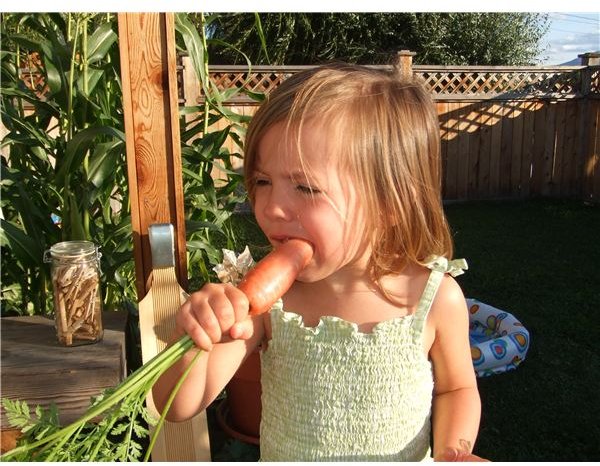Why Organic Food is Best for Baby - Tips to Keep Harmful Pesticides Out of Your Child's Diet
What Makes Organic Food Better?
Food that is certified organic by the US Department of Agriculture (USDA) has to meet several standards of quality. According to a USDA consumer brochure titled Organic Food Standards and Labels: The Facts, “organic food is produced without using most conventional pesticides; fertilizers made with synthetic ingredients or sewage sludge; bioengineering; or ionizing radiation.” Organically-raised meat and dairy products come from animals that have been given no antibiotics or growth hormones. Government-approved certifiers visit organic farms to ensure organic standards are met, including practices that improve the soil and enhance environmental quality. Facilities that process organic foods must be certified as well.
USDA certified organic foods are not genetically modified (GM). Some studies suggest that GM foods may pose a greater risk of triggering allergic reactions. Children are most susceptible to allergies during the first year of life. While the long-term effect of consuming GM foods has not been sufficiently studied, it is a good idea to keep these unnaturally-produced foods out of your baby’s diet.
The nutritional benefits of organic foods have recently been more closely studied. Early results from a 2007 study by EU-based researchers suggest that some organic fruits, vegetables, and milk may contain more nutrients and antioxidants than their non-organic counterparts. The 18 million-Euro study is the most extensive study to date researching the pros and cons of organic foods (see their website here).
In short, organically grown and raised food steers clear of most controversial or questionable agricultural practices. Feeding organic food to your baby is one way you can be sure to keep potentially harmful substances - like traces of synthetic pesticides and fertilizers - out of your baby’s system.
It’s Up to Parents to Decide What’s Safe
Even trace amounts of chemicals used in conventional farming can be potentially harmful to a developing baby. Keep in mind that the studies recommending “safe” levels of toxin exposure for humans are not conducted on infants - but on older children and adults. In the absence of adequate data parents must choose what they feel is right.
Eating non-organic foods can expose your baby to more pesticide residue per pound of bodyweight than for a typical adult. Where dealing with a small amount of toxins may be manageable for an adult’s body, a baby’s digestive system and organs may be unable to process these foreign substances. The presence of toxins may interfere with your baby’s rapid development.
A 1995 study by the Environmental Working Group (EWG) tested eight conventionally-grown and prepared baby foods produced by three main companies that accounted for 96% of the baby food market at the time. According to the EWG report, “sixteen pesticides were detected in the 8 baby foods tested, including three probable human carcinogens, five possible human carcinogens, eight neurotoxins, five pesticides that disrupt the normal functioning of the hormone system, and five pesticides that are categorized as oral toxicity category one, the most toxic designation.”
In 2007 the EWG tested conventionally-grown fruits and vegetables for pesticide residue and rated them accordingly. The EWG found that the following “dirty dozen” foods tested highest in pesticide residue: peaches, apples, sweet bell peppers, celery, nectarines, strawberries, cherries, pears, imported grapes, spinach, lettuce and potatoes. Whether you buy prepared baby food or make your own, feed your baby organically-grown versions of these foods.
This post is part of the series: Organic Baby Food
The best way to be sure all the ingredients that go into your baby’s food are safe and healthy is to make it yourself at home. Read this series of articles to see how easy it is to make your own organic baby food.
